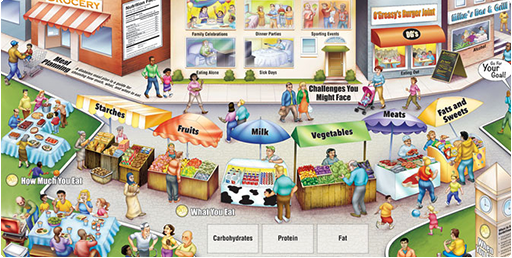Mapping Your Plan to Control Blood Glucose with Diabetes Education
Conversation Maps® are being used by UMass Memorial Diabetes Center of Excellence educators to teach self-management

The UMass Memorial Diabetes Center of Excellence (DCOE) offers an extensive self-management education program recognized by the American Diabetes Association. It’s designed to provide information, motivation and support. Diabetes educators at UMass Memorial utilize Conversation Maps® during to help people with lifestyle changes such as healthy eating, medication management, physical activity and other topics.
Diabetes Conversation Maps
Conversation Maps® are designed to promote interactive discussion in a small group setting of people living with diabetes. Each map addresses a different topic area to assist with self-management.
”The visual aspect of the Conversation Maps® has been found to encourage interaction among those attending our education workshops,” said Cheryl Barry, RN, MS, CDCES, Manager of Adult Diabetes Education at the UMass Memorial DCOE. “The maps help empower people to better control their diabetes through self-management."

Lowering A1c with Diabetes Education
Diabetes education has proven to lower A1c by as much as 1% (similar to adding a medication but without the side effects). Research shows that people who received diabetes education are more likely to take medications as prescribed and control their blood glucose, blood pressure and cholesterol. As a result, those people have lower health costs.
The American Diabetes Association recommends at least 10 hours of diabetes education. Medicare benefits include 10 hours of initial education plus 2 hours of follow-up each year. Commercial insurance offers similar benefits. More than half of the 37 million Americans diagnosed with diabetes have not taken advantage of the benefits of diabetes education.
Patient Success Story: Kevin Brady
Kevin was diagnosed with type 2 diabetes during his mid 50’s. At first, he didn’t respect it. “I didn’t feel sick,” he said. “I had heard about all the bad things that diabetes can lead to but I didn’t feel any urgency to do anything about it.”
Five years later, he was taking diabetes medication prescribed by his primary care physician but did little else to monitor and manage his blood sugars. Eventually Kevin developed neuropathy in his feet and numbness in his hands.
“They kept increasing my medication dosage,” he said. “I modified my diet but my blood sugars still climbed very high.” Kevin eventually developed liver and heart problems. When his doctor told him it was caused by uncontrolled blood sugars, he finally decided to take action. His primary care physician referred him to the introductory diabetes education workshop offered at the UMass Memorial DCOE.
“After the first session, I knew it was different from when people tried to teach me this stuff before,” he said. “She [diabetes educator Cheryl Barry] not only explained what we needed to do, but also provided a detailed game plan and described how to go about it, as well as the reasoning behind each modification.”
Kevin lost 40 pounds by eating healthy and exercising regularly. His energy increased and he was able to control his blood sugars. “The workshops made it clear that the only way to get results is to take action. I’m still enjoying my favorite foods, but in moderation.”
“We are very proud of Kevin,” said Barry. “When we first met, his A1c was 8%. He lowered it to 6%, and equally important, has maintained it!”
Kevin raved about how the information provided during the workshops was presented in a new & refreshing manner. “Cheryl made it clear that it’s up to us to implement what we learn,” he said. “Instead of simply receiving a to-do list, it was interactive. We discussed specific examples and she made the information relevant and useful.”
In the past Kevin had eaten foods that he thought were healthy but didn’t understand the different types of carbohydrates, sugars, fiber, and how the body processes them. The diabetes education workshops taught him how to read nutrition labels. He learned basic carb counting and appropriate portion sizes.
“I started weighing and measuring portions and began to see a difference," he said. “It was amazing how little needed to be eliminated from my diet but instead to simply adhere to portion control.”
Planning is key to his success. “I now have a daily meal plan and strategies for eating out at restaurants or at other people’s homes.”
Kevin also enjoyed the interactive nature of the workshops. He found it beneficial to meet and speak with other people who had been struggling with similar challenges. Attending the four sessions made him realize that diabetes is a serious condition and must be dealt with to avoid future complications. His new diabetes education provided the information, tools and resources to successfully manage it daily. “Take it one day at a time and make gradual changes,” he said.
By controlling his blood sugar, Kevin’s liver and cardiac issues are under control, and his typically low blood pressure normalized. His neuropathy is “better than it was” and he’s taking less medication!
“I’m in my 60’s and plan to live for another 30 years,” he said with a smile. “Suddenly 80 doesn't seem as old as it used to!”
Register for Education Workshops
Ask your physician or diabetes care team to provide a referral for either a group education workshop or a one-on-one education appointment. For more information about the Diabetes Education Program at the UMass Memorial Diabetes Center of Excellence, email: cheryl.barry@umassmemorial.org or call (508) 334-3206.
Diabetes Education Resources
These videos and informational resources cover a wide variety of self-management topics for all people living with diabetes and their families
